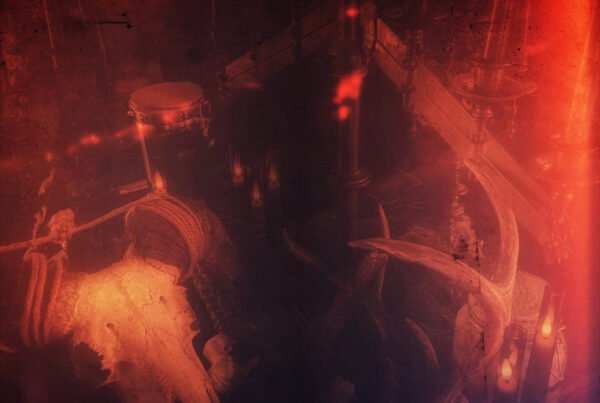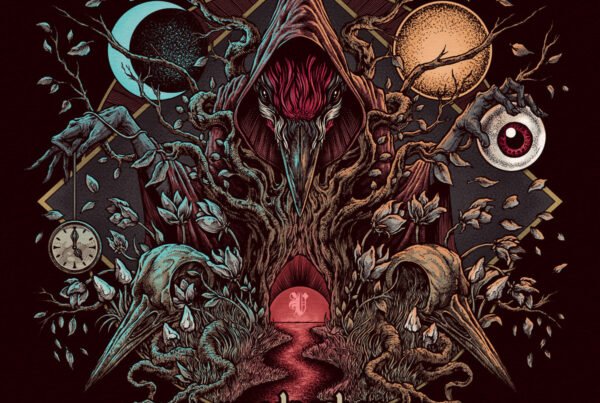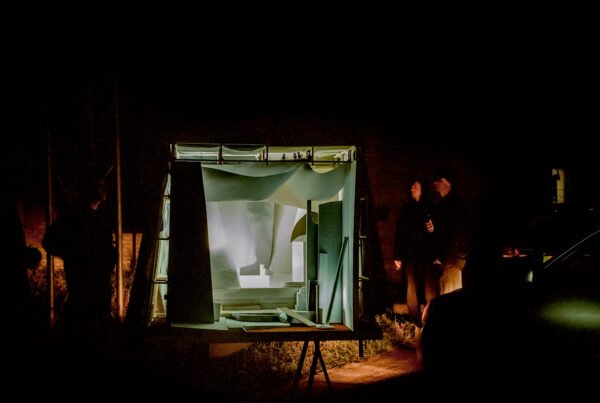Gloomgaze pioneer Planning For Burial returns with It’s Closeness, It’s Easy, adding a more refined sentimentality to the gloom and doom.
Release date: May 30, 2025 | The Flenser | Facebook | Instagram | Bandcamp
The warmth of summer approaches, and with each new lengthening day of sunlight and warmth, the mental thaw of winter recedes. This cycle of the seasons, the heat and chill, light and darkness, and other simplistic dualities are well-known, significant throughout history and art, but in that, kind of played out. As I get older, the repeating ups and downs of life and its conditions become less noticeable. Instead, I find that we confront the endless plane of time, how it slowly ravages and degrades the things that once so ardently demanded our attention from jagged rocks into eroded stones carpeting the beach of life, noticeable and beautiful in their own way while becoming an easily traversed part of the scenery.
This may seem bleak or bland, but the process of time and aging turns those well-worn stones of cyclical patterns into a bigger picture, a mosaic of emotions and stress and sun-faded memories that inform each new day’s conflicts and celebrations. It is in this mosaic that It’s Closeness, It’s Easy, the first full-length album from Planning For Burial in eight years, dwells. Planning For Burial is a fiercely DIY solo project by Thom Wasluck, and as the project’s name suggests, Planning For Burial has never existed outside the shadow of death’s binding presence. On It’s Closeness, It’s Easy, however, Wasluck let’s go of some of the rougher edges the project has held onto since his 2009 debut, Leaving, letting the more contemplative and atmospheric elements of his music take the lead.
The characteristic ‘gazey doom is still here, but the loudness seems softer, more ethereal. Opening track, “You Think,” is heavy in its attack, blasting drums and over-driven fuzz guitars at full blast, but the sweetly melancholic chords and Wasluck’s buried vocals reveal the track to be closer to My Bloody Valentine than My Dying Bride. As the almost blackgaze first third of the track fades, a series of synths swell in a breakdown that builds anticipation for another onslaught of blast beats. Instead, however, the loudness is accompanied by even prettier guitar sounds, twinkles of glockenspiel, and a foggy hopefulness builds through the burdened amplifiers.
The next two tracks are a hypnotic continuation of guitar swirls, strings, and ambiance that lead you to a “A Flowing Field Of Green” where vocals return with a Neil Young drawl over post-punk drums, rubbery bass slides, and a forlorn intensity. As the Deftones-esque art metal picks up, again we hear the bells that so often adorn Planning For Burial‘s work. They exist as a charming counterpoint to the heft of his songcraft, complimenting the melody like accent marks. This trick always reminds me of Bruce Springsteen‘s E Street Band, but instead of The Boss’s tales of working-class hopefulness through boardwalks, old Chevy’s, and romance, Wasluck is grappling with watching friends and loved ones suffer through life’s changes, addiction, and the recognition that hope comes from close bonds and community, not open-road imagery.
Slowcore remains a significant influence for Planning For Burial, not just on tracks like “(blueberry pop)” or “Grivo” where softer instrumentals and hushed vocals add dynamics to the album, but in the way each element of the music unfolds. The doom-laden “Twenty Seventh Of February” is driven by a hauntingly sweet melody that slowly deconstructs into a wash of feedback by the end. This is followed by the post-punk inspired “Fresh Flowers For All Time” which lets a driving low bass, layers of guitar, and piano arpeggios compose the most upbeat feeling song on the album, a rare danceable track.
It’s Closeness, It’s Easy doesn’t reinvent the wheel for Planning For Burial, but then again, it doesn’t need to. The core elements of Wasluck’s music are unique enough to defy easy categorization, and even with a more mature approach that favors gloss over grit, Planning For Burial is still singular in its sound, turning the slow, crushing weight of existence into an art that will weather the expanse of time far beyond all of our expiration dates. This is music for summer nights where reflections of the day’s events and many other days past get the best of you until there is nothing left to do but crank the speakers and stare at the stars, mournful of every loss but filled with love that it was experienced.






